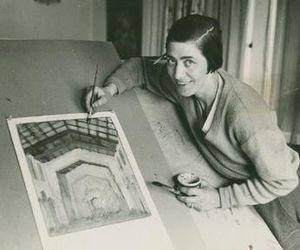Lucile Lloyd facts for kids
Quick facts for kids
Lucile Lloyd
|
|
|---|---|
 |
|
| Born | August 28, 1894 Cincinnati, Ohio, U.S.
|
| Died | February 25, 1941 (aged 46) |
| Nationality | American |
| Other names | Lucile Lloyd Brown, Lucila Lloyd Nulty |
| Education | Woman's Art School at Cooper Union, Art Students League of New York |
| Known for | Muralist, Illustrator, Decorative Painter |
| Spouse(s) |
Addison Brown, Jr.
(m. 1919–1925)Niel McNulty
(m. 1936–1939) |
Lucile Lloyd (born August 28, 1894 – died February 25, 1941) was an American artist. She was famous for painting large pictures directly onto walls, known as murals. She also worked as an illustrator and decorative painter. In 1937, Lucile Lloyd created three important murals for the state building in Los Angeles, California. She did this as part of the Works Progress Administration's Federal Arts Project, which helped artists during the Great Depression.
Contents
Early Life and Art Training
Lucile Lloyd was born in Cincinnati, Ohio. Her parents were Mary Alice and Harry Kensington Lloyd. She learned a lot about art from her father. He had a studio where he designed stained-glass and textiles (fabrics). Her English grandfather was also a textile designer, working in the Arts and Crafts movement.
Lucile went to the Woman's Art School at Cooper Union in New York City. She was very talented and won two scholarships to the Art Students League of New York. She studied with famous teachers like Frank Fairbanks and Frederick Dielman. At just 20 years old, she painted her first mural. She was also the first woman to work in the design office of architect Bertram G. Goodhue.
In 1919, Lucile married Addison Brown II. They had one son, Addison Brown III.
Lucile Lloyd's Artistic Career
In 1919, Lucile moved to California with her husband and son. She opened her own art studio there. She also taught art classes and became the director of the Stickney Memorial Art School in Pasadena, California.
Lucile was a busy artist. She painted murals and decorated buildings. She also designed things like bookplates, cartoons, and logos. She worked with many well-known architects. She helped them make their buildings look beautiful inside.
Connecting Architecture and Art
In 1923, Lucile wrote an article called The Relationship Between Architecture and Decoration. She explained that architects design buildings, but artists help make them complete. She believed that artists who paint murals should be involved from the very start of a project. This way, the art would fit perfectly with the building's design.
She said it was important for muralists to have enough time to plan their work. This included making detailed drawings and color sketches. Lucile also stressed that mural artists are different from house painters. They create special artwork that becomes part of the building itself.
Famous Murals and Later Life
In 1925, Lucile's husband, Addison Brown II, divorced her. He moved back to the East Coast with their young son.
One of Lucile's most famous murals was The Madonna of the Covered Wagon (1928). She painted this large mural for a middle school in South Pasadena. It showed pioneer families traveling west in the 1800s. Even though some people thought it was a bit too sweet, it was a great example of the popular "Illustrators School" style of her time. An art critic from the Los Angeles Times praised it, saying it had a wonderful mix of humor and feeling.
Lucile was one of six artists who submitted designs for murals at the Griffith Observatory. She was also a member of several art groups. These included the California Art Club and Women Painters of the West.
She married her second husband, Niel McNulty, in 1936. Sadly, he passed away in 1939. Lucile Lloyd herself died in 1941.
Selected Commissioned Artwork
Lucile Lloyd created many beautiful artworks for different places. Here are a few examples:
| Year | Name of Artwork | Location | Notes |
|---|---|---|---|
| 1916 | Music room ceiling murals | John E. Aldred Estate, Glen Cove, New York | Part of a Bertram Goodhue architecture project. |
| 1917 | Mural on the great hall ceiling | Philip W. Henry house in Scarborough, New York | Another Bertram Goodhue architecture project. |
| 1928 | Madonna of the Covered Wagon mural | South Pasadena Junior High (now South Pasadena Middle School), Pasadena, California | This large oil painting showed pioneers traveling west. It was installed in the school's auditorium. |
| 1930 | Kindergarten Frieze | Stoneman Elementary School, San Marino, California | This mural was saved and restored in 1997. |
| 1937 | Three murals, California's Name | Assembly Room, State Building, Los Angeles, California | These murals showed the history of California. They were moved to the California State Senate in Sacramento after the original building was damaged in an earthquake. |

